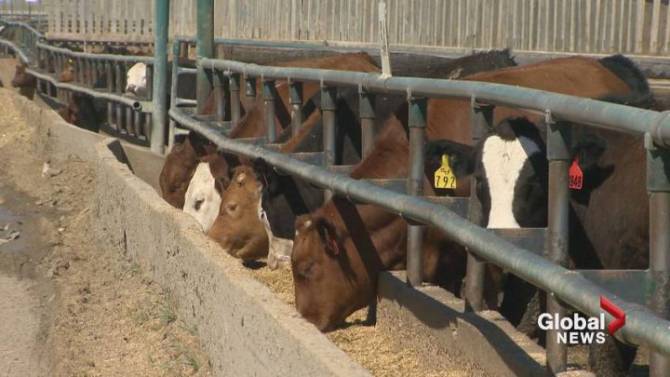An investigation has been launched by the Canadian Food Inspection Agency (CFIA) after a case of bovine tuberculosis (bovine TB) was found on a farm in the southern interior of B.C.

In a statement, the CFIA says it cannot provide more information relating to location for confidentiality reasons.
On Tuesday, it did confirm the cow was slaughtered in Alberta.
An official with Alberta Beef Producers would not confirm which of Alberta’s four federally regulated plants the cow was slaughtered at.
The CFIA says a mature beef cow was presented for slaughter on Oct. 26. A post-mortem examination found the presence of granulomatous lesions in the mediastinal lymph nodes, lungs and liver. The carcass was condemned, and no portions of the animal entered the food chain.
This was a federally registered slaughterhouse so all animals are inspected to ensure they are handled humanely and meet all regulatory requirements and laws.
WATCH: (Aired Oct. 31, 2016) What is bovine tuberculosis?

Samples from the cow were shipped off for testing and confirmed a case of bovine TB.

Get weekly health news
“A this point there’s no evidence to connect it to anything in Alberta or the previous case in 2016,” Alberta Beef Producers beef production specialist Karin Schmid said Tuesday.
“That’s devastating to lose that livelihood, to lose all that work that’s been put into it. The bright side is that the wider industry is not affected by this case.”
The CFIA says Canada’s international status is currently bovine TB-free and these findings should not affect Canada’s current international status.
According to the CFIA, bovine TB is a “reportable disease in Canada and has been subject to a mandatory national eradication program since 1923. While Canada is considered to be officially free of bovine TB today, isolated cases may occur. There is no risk to the food supply or to human health from this case.”
Humans can contract bovine TB but it is very rare. Exposure can only occur through the passage of fluids from an animal to an open skin sore, extended close contact with an animal with active respiratory TB or by drinking unpasteurized milk from an infected animal.
The CFIA has begun tracing movements of the animal in the infected herd to try to identify the source and any potential spread of the disease.
As the investigation is in the early stages, the exact number of herds involved and the time to complete the investigation is not yet known.
— With files from Heide Pearson








Comments